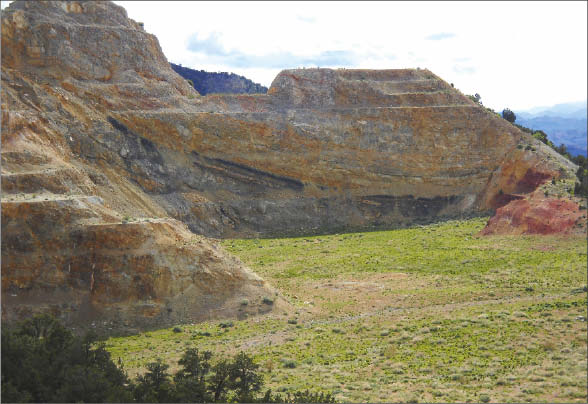Two gold hits in Utah have vaulted Cadillac Mining’s (CQX-V) share price up 20.5¢, or 241%, to 29¢ on 8.4 million shares traded.
The reverse-circulation results, all drilled from the same platform, included 82 metres carrying 1.25 grams gold per tonne and 73 metres grading 1.08 grams gold, both starting at 24 metres depth, while a third hole did not hit significant mineralization.
Victor Erickson, president and CEO of Cadillac, explains by phone that the two holes hit were oriented in the opposite direction as the third, with the holes designed to shore up confidence in old data and target a historic resource.
“We were basically confirming some of their prior drilling, and actually we got better results than they had,” Erickson says. “Better thicknesses, and generally better grades, too.”
The recent holes tested an area near the historic Hamburg and Basin pits, which are among the 12 open pits that were mined between 1988 and 1996.
Erickson explains there is a whole area west along a graben (downfaulted block of rock) that saw limited exploration in the past.
“There’s a whole area that’s essentially 1,000-by-400 metres that is an immediate target, with no drill holes in it,” Erickson says. “On the other hand, if you step back, the graben that we’re talking about thins at the ends somewhat, but it’s a full 2 km long. And there are a series of drill holes in it that have ore-grade material, but it obviously wasn’t drilled at US$1,700 gold.”
The low gold price in the late 1990s was one of the reasons the Goldstrike project, sitting 13 km east of the Nevada border in southwest Utah, closed after producing 210,000 oz. gold from a heap-leach operation. Since then a few deep holes were drilled to test the biggest pit at depth, but no exploration had been done after 1999.
So when Cadillac started looking in eastern Nevada and western Utah in 2010, drawn by the discoveries of AuEx Ventures and Fronteer Gold, the company found close to half of the old mine unclaimed while the rest was on patented ground. The company arranged a lease agreement on 40 patented claims and staked just over 200 federal claims for a 19-sq.-km land package.
The company secured the project in early 2011, but after a longer-than-expected permitting process, Cadillac finally got to drill its first three holes in November.
The drill results, and the share price movement, are just what Cadillac needed, as the company is out of money. It raised $150,000 in December at 7.5¢ a unit, which is enough to complete the 567-metre drill program on Goldstrike and fulfill its January spending requirement, but it will have to raise more money to keep exploring.
The plan is to raise money and better understand the structure with diamond drilling, Erickson says, adding that “we know that the graben is really important for mineralizing, but it’s so complex we have to go back with a core drill so we can actually pull some structure out of the ground.”
The company reports that the oxidized gold mineralization is Carlin-type hosted in a Tertiary-age sandstone, unconformably overlying an older limestone.
Because high-angle faults and post-mineral cross faults have created a complex geometry, the company does not yet understand the intercepts’ true widths.
Cadillac is already permitted for 19 holes and has an application for more. It doesn’t expect drilling delays, as long as its financing goes smoothly.
The company has 27 million shares outstanding.


Be the first to comment on "Cadillac Mining up 241% on Goldstrike results"